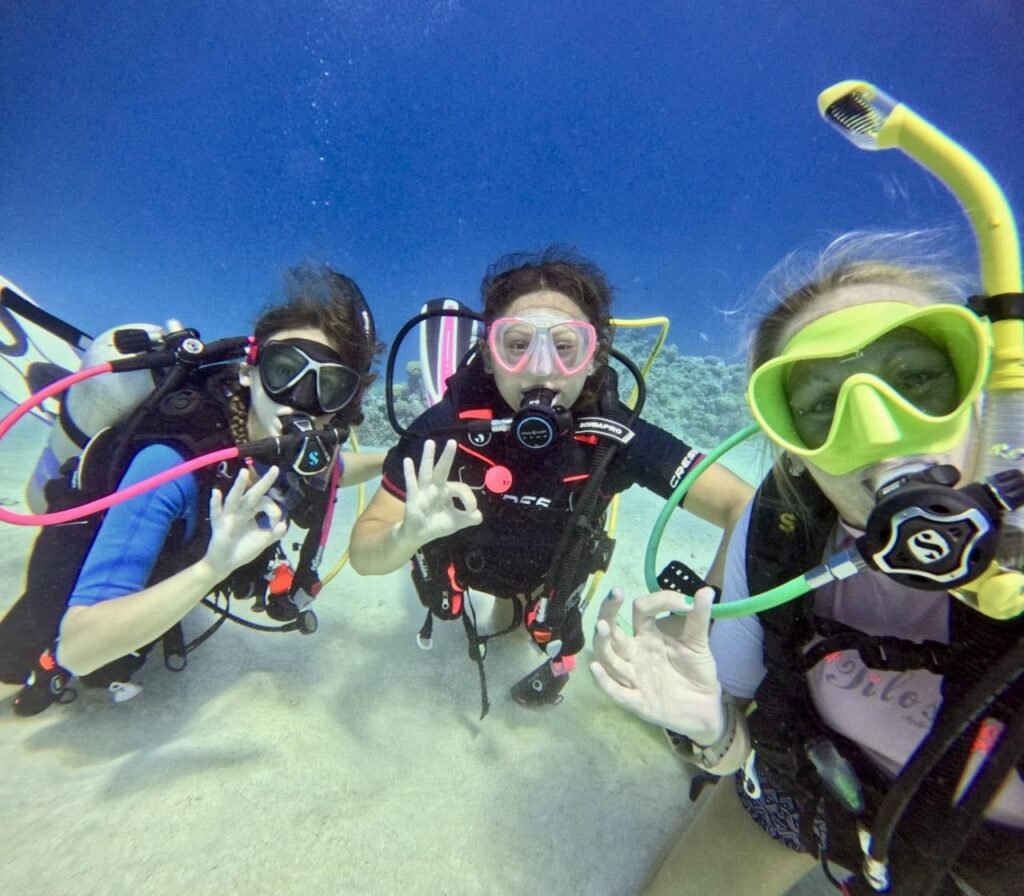Taking your first deep-water dive can be thrilling! You’re about to explore an amazing underwater world full of colorful fish, beautiful coral reefs, and exciting adventures. But diving for the first time can also be a bit nerve-wracking. Don’t worry, though! With the right preparation and mindset, you’ll be ready to dive in with confidence. In this guide, we’ll give you some easy tips to help you get started and feel prepared for your first scuba diving course. Let’s get ready to explore the ocean!
1. Pick the Right Dive School
Choosing a good dive school is very important. This is where you’ll learn all the basics, and having a great teacher will make you feel safer and more confident. Look for schools that are approved by organizations like PADI (Professional Association of Diving Instructors) or SSI (Scuba Schools International). These are well-known and respected groups in the diving world.
Before signing up for a scuba diving course, check online reviews or ask for recommendations. If you can, visit the dive school and meet the instructors. They should be friendly, patient, and knowledgeable. You want someone who will explain everything clearly and help you feel comfortable.
2. Learn About the Equipment
Scuba diving requires some special gear, but don’t worry, you’ll learn how to use it step by step. Here’s what gear you’ll be using in your scuba diving course:
- Mask: This helps you see underwater.
- Snorkel: A tube that lets you breathe at the surface without using air from your tank.
- Fins: These make it easier to swim through the water.
- Buoyancy Control Device (BCD): This helps you float, sink, or stay in one place underwater.
- Regulator: The device you breathe through.
- Dive Computer: It keeps track of how deep you are and how long you’ve been underwater.
When you join a scuba diving course, your institute will likely provide all the equipment you need. But it’s a good idea to learn what each piece does so you feel more comfortable using them. Once you’re more experienced, you might want to buy your own gear.
3. Be Comfortable in the Water
Being comfortable in the water is important for diving. You don’t have to be an excellent swimmer, but you do need to feel confident in the water. Many dive courses include a swim test where you’ll swim a short distance and float for a few minutes.
If you’re nervous about this, try practicing in a pool before your scuba diving course. Get used to floating, swimming, and staying calm in the water. The more relaxed you feel, the easier it will be to focus on learning how to dive.
4. Take Care of Your Health
Before starting your scuba diving course, you’ll need to fill out a health form. Some conditions, like asthma or heart problems, might need a doctor’s approval before you can dive. It’s important to be honest on the form for your own safety.
Also, make sure you’re feeling well on the day of your dive. Diving with a cold or congestion can be uncomfortable and may cause problems with your ears. If you’re not feeling your best, it’s okay to wait until you’re better.
And don’t forget to drink plenty of water! Staying hydrated helps prevent problems like decompression sickness, which can happen if you don’t have enough fluids in your body.
5. Practice Equalizing Pressure in Your Ears
When you dive, the pressure in the water changes as you go deeper. This can make your ears feel uncomfortable if you don’t adjust, or “equalize,” the pressure. A simple trick to do this is to pinch your nose and gently blow it like you’re trying to blow your nose. This helps balance the pressure in your ears.
Practice this technique before your scuba diving course so it feels natural. During your dives, remember to equalize your ears often, especially as you go deeper, to avoid any pain.
6. Stay Calm and Breathe Slowly
It’s normal to feel a little nervous during your first few dives. But staying calm is really important in scuba diving. The more relaxed you are, the better you’ll be able to control your movements and enjoy the dive.
Take slow, deep breaths while underwater. This helps you save air and stay calm. If you start to feel nervous, pause for a moment, breathe slowly, and remind yourself that you’re in control. If something doesn’t feel right, signal to your instructor for help. It’s always okay to ask for a break.
7. Learn to Control Your Buoyancy
One of the trickiest things in diving is learning to control your buoyancy—whether you float, sink, or stay in one place. This is what the BCD (Buoyancy Control Device) is for. Controlling your buoyancy helps you avoid bumping into things underwater, which is important for protecting both yourself and the environment.
During your scuba diving course, you’ll practice using your BCD to adjust your buoyancy. It might take a few tries to get it right but don’t worry, it’s something all divers work on, even experienced ones. With time, you’ll get the hang of it!
8. Dive with a Buddy and Communicate
During your scuba diving course, you’ll never dive alone. Having a dive buddy is important for safety and makes the experience more fun. Your buddy can help you if you have trouble with your gear or just need support.
Before each dive, you and your buddy will check each other’s equipment to make sure everything is working properly. You’ll also learn hand signals to communicate underwater since you can’t talk with your regulator in your mouth. Practice these signals so you feel confident when it’s time to use them.
9. Respect the Underwater World
The ocean is home to many beautiful and delicate ecosystems, so it’s important to treat the underwater environment with care. When you’re diving, remember to avoid touching anything, especially corals, which are fragile and can be damaged easily.
Also, keep your distance from marine animals. While it’s exciting to see fish, turtles, and other creatures, it’s best to watch from afar so you don’t disturb them. Think of the ocean as their home, and we’re just visitors. It’s our job to be respectful and protect their space.
10. Keep Learning and Have Fun!
Once you finish your first scuba diving course, you’ll be a certified diver, but that’s just the beginning! There’s so much more to explore and learn in the world of diving. You can take advanced courses to learn new skills like underwater photography or night diving. Every dive offers something different, so you’ll always find new adventures.
The secret is to enjoy yourself and the process! Diving is an amazing way to see the world from a whole new perspective. With each dive, you’ll become more confident and discover more of the ocean’s wonders. So, take a deep breath, dive in, and enjoy the incredible journey that awaits you underwater!
Summary
Starting your scuba diving course is an exciting adventure! To ensure a smooth experience, choose a reputable dive school, familiarize yourself with essential equipment, and feel comfortable in the water. Prioritize your health by filling out the necessary forms and staying hydrated. Practice equalizing ear pressure and remember to stay calm while diving. Always dive with a buddy, respect marine life, and embrace continuous learning. With preparation and a positive mindset, you’ll confidently explore the underwater world!




